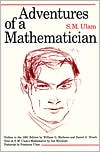

 |

|

The average rating for Adventures of a Mathematician based on 2 reviews is 4.5 stars.
Review # 1 was written on 2012-12-14 00:00:00 J Ignacio Catala J Ignacio Catala"This was more agreeable than the present style of the research papers or books which have so much symbolism and formulae on every page. I am turned off when I see only formulas and symbols, and little text. It is too laborious for me to look at such pages not knowing what to concentrate on. I wonder how many other mathematicians really read them in detail and enjoy them." This is quite remarkable coming from one of the top mathematicians of his time. His own approach to mathematics was definitely more verbal and less symbol-based. |
Review # 2 was written on 2017-09-11 00:00:00 Amy Grenier Amy GrenierStanislaw Ulam was a prominent twentieth-century mathematician, famous for inventing Monte Carlo methods -- and co-inventing the hydrogen bomb. This is not quite an autobiography. It's one part memoir, one part musings on science and mathematics, and one part character sketches and anecdotes. It originally started, not as an autobiography of Ulam, but as a memoir of his friend and colleague, John von Neumann. However, the scope grew, and it's now a long picaresque tour of Ulam's life, times, and contemporaries. Several bits caught my attention. First, his description of childhood, college, and graduate mathematics in inter-war poland. My grandfather grew up in a similar milieu so this held personal resonance. It was emotional reading though -- most of the teachers and colleagues he mentions are tagged with "murdered by the Germans" or "died of hard circumstances in Russian exile in 1944" and the like. It was a grim time to be a Pole. Ulam was a visiting fellow at Harvard in the United States when the war broke out -- basically a postdoc. And he had his kid brother Adam with him, who was just about to start college. When the war started, the two brothers were cut off from their family and the family money -- and Stanislaw reports how frightened and worried he was making ends meet while getting his brother into a college (Brown). Adam turned out fine, as it happens, and went on to become a prominent Sovietologist. By 1943, Stanislaw Ulam got pulled into the Manhattan Project, and went to work in the theory group at Los Alamos. He spent the rest of his career bouncing between academic jobs and the lab. During a period at the lab, he collaborated with Edward Teller on the development of the "super." Credit for the invention is disputed -- Teller claimed at various points that the key ideas were his -- but several observers, notably Bethe, think that Ulam made the primary contributions. In Ulam's account here, he had an idea, knew it was a big important idea, told Teller, and they jointly improved it and it formed the basis of all future bombs. Ulam is coy about technical details though -- you won't learn anything about engineering a hydrogen bomb in this book. As I mentioned, this book originally as about von Neumann, not Ulam. Von Neumann was one of the most interesting figures of the century, and Ulam was one of the few people who thought of him as a friend and an equal, not a demigod or a enfant terrible. Ulam's describes Johnny (as he calls him) as exceedingly quick and clever, but not so imaginative or bold as others -- and perhaps with a chip on his shoulder about doing applied math and quasi-math rather than many deep fundamental new mathematical discoveries. The best of the stories is that one day, von Neumann walked into Ulam's office at Princeton to discuss a math problem and said "the goyim have proved the following theorem" -- with the implication being that "we jews should be able to prove a stronger one." Ulam repeated the joke, and apparently Banach (a "pure goy") thought it was hilarious. Ulam has a long description of the Oppenheimer affair (and like the other scientists, felt that Oppenheimer had been treated shabbily.) He does repeat with endorsement Johnny's comment about Oppenheimer's moral feelings: "Some people profess guilt to claim credit for the sin." The other favorite story of mine is as follows. After the war, Ulam had a very serious case of encephalitis, and was near death and unable to think. Even after his release from the hospital, he was worried he had suffered serious permanent brain damage. Erdos came to visit, and they played chess. Ulam won, but worried that Erdos was going easy on him. They played a second game, Ulam won again, and then Erdos said "okay, that's enough chess, I'm done for the night" -- and Ulam felt reassured that his partner had really been trying. Some choice excerpts from the book are available online: |
CAN'T FIND WHAT YOU'RE LOOKING FOR? CLICK HERE!!!